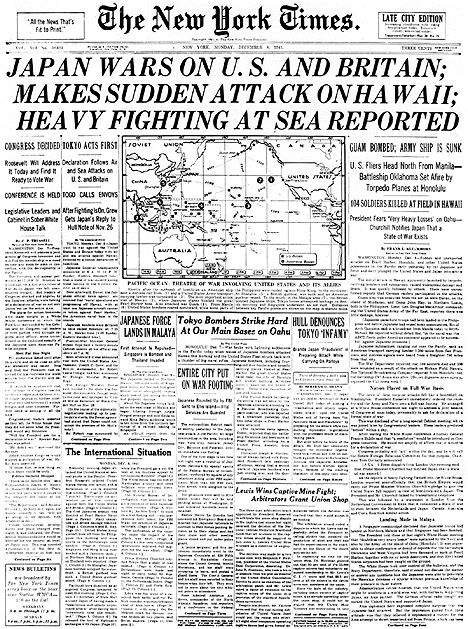| Tweet |

http://ameblo.jp/warm-heart/entry-10059154335.html
2007-12-08 13:06:03
gataro-cloneの投稿
今日は何の日 日米開戦の日 当日のニューヨーク・タイムズ紙から
テーマ:戦争と平和、靖国問題
下の画像は日米開戦当日(本日)のニューヨーク・タイムズ紙面である。 Hawaii Attacked Without Warning Reports from Hawaii indicated that Honolulu had no warning of the attack. Japanese bombers, with the red circle of the Rising Sun of Japan on their wings, suddenly appeared, escorting by fighters. Flying high, they suddenly dive-bombed, attacking Pearl Harbor, the great Navy base, the Army's Hickam Field and Ford Island. At least one torpedo plane was seen to launch a torpedo at warships in Pearl Harbor. A report from Admiral C. C. Bloch, commander of the naval district at Hawaii, expressed the belief that "there has been heavy damage done in Hawaii and there has been heavy loss of life." This was subsequently confirmed by Governor Joseph B. Poindexter of Hawaii in a telephone conversation with President Roosevelt. The Governor also said that there were heavy casualties in the city of Honolulu. At the White House it was officially said that the sinking of the Army transport carrying lumber and the distress signal from another Army ship "indicate Japanese submarines are strung out over that area." Heavy smoke was seen from Ford Island near Honolulu. In the raids on Hawaii Japanese planes were shot down, one bomber hitting and bursting into flames just behind a post-office on the Island of Oahu. It was reported without confirmation that six Japanese planes and four submarines were destroyed. The second attack on Honolulu and its surrounding bases occurred just as President Roosevelt was talking to Governor Poindexter at 6 o'clock last evening. There was no official confirmation of Untied Press reports from Honolulu that parachute troops had been sighted off Pearl Harbor. Many Japanese and former Japanese who are now American citizens are in residence in Hawaii. Saburo Kurusu, special Japanese envoy who has been conducting "peace" negotiations while Japan was preparing for this attack, and Ambassador Kichisaburo Nomura called at the State Department at 2:05 P. M. after asking for the appointment at 1 P. M. They arrived shortly before Secretary Hull had received news Japan had started a war without warning. Mrs. Roosevelt revealed in her broadcast last night that the Japanese Ambassador was with the President when word of the attacks was received. The two envoys handed a document to Mr. Hull, who kept them waiting about fifteen minutes. Upon reading it, he turned to his visitors to exclaim that it was "crowded with infamous falsehoods and distortions." President Roosevelt ordered war bulletins released at the White House as rapidly as they were received. A sentence or two was added to the story of the surprise attack every few minutes for several hours. Cabinet members arrived promptly at 8:30 last evening for their meeting in the White House Oval Room. President Roosevelt had been closeted with Harry L. Hopkins in the Oval Room since receiving the first news. He had conferred with Secretaries Stimson and Knox by telephone and also with General George C. Marshall, Chief of Staff. Admiral Harold R. Stark, Chief of Naval Operations, was too busy to talk to the President even by telephone. The first to arrive was Secretary of Commerce Jesse H. Jones. Secretary Knox came last. Secretary Hull was accompanied by two bodyguards. Congressional leaders joining the Cabinet in the Oval Room at 9 P. M. included Senator Hiram Johnson of California, hitherto an isolationist and for long the ranking minority member of the Senate Foreign Relations Committee. Others present were Speaker Rayburn, Representative Jere Cooper of Tennessee, representing Representative John W. McCormack, the House Majority Leader, who was not able to reach Washington in time for the conference; Chairman Sol Bloom of the House Foreign Affairs Committee and Representative Charles A. Eaton, ranking minority member; Vice President Wallace, who flew here from New York; Senator Allen W. Barkley, majority leader; Senator McNary and Senator Warren R. Austin, ranking minority member of the Foreign Relations Committee. Cheering crowds lined Pennsylvania Avenue to see them arrive, another evidence of the national determination to defeat Japan and her Axis allies which every official is confident will dominate the country from this moment forth. Senator W. Lee O'Daniel of Texas, of hillbilly band and hot biscuits fame, added a touch of inadvertent comedy to the scene when he arrived uninvited. He said he had come to "try to learn a few things" and "to make sure Texas is represented at this conference," thus ignoring the presence of Senator Connally. Senator Barkley, who arrived in Washington by automobile about 7 P. M., said he did not find out about the Japanese attack until nearly 6 o'clock. The formal positions of the United States and Japanese Governments toward the war were officially set forth by the release at the White House of the text of President Roosevelt's message of yesterday to Emperor Hirohito and by the Japanese document handed Ambassador Grew in Tokyo. 上記は --------------------------------------- 日本からすると当時の米英は日本のアジア完全制圧を邪魔する「鬼畜米英」だったし、米英からすると当然日本は「悪の枢軸」の一角であり、「ならず者」国家だったわけである。 戦後 gataro は復員してきた父親の自暴自棄から来る放蕩と養育拒否のため生家を失い、ホームレス生活を余儀なくされたり、「子供の家」と呼ばれる孤児院で生活したりして、かなりの辛酸をなめさせられた。それでも、戦後にどんなに辛い目にあったにしろ、生きていて良かったと思っているし、戦争は負けて良かったと思っている。もし勝っていたら日本はどんな恐ろしい国になっていたことだろう。そう思うと、負けて良かったのだ(もっとも、科学的に分析すれば勝てるはずのない戦争だったが…)。 勝ったアメリカが、戦争当時は日本よりはまだましな国だったアメリカが、今世界中で何をしているのか!それを思うと、やはり日本は負けて良かったのだ。 残念なのは、あれほどの犠牲を払わないと、あれほどの高い授業料を払わないと、日本が曲がりなりにもいわゆる「民主国家」に生まれ変わることができなかったことだ。何しろ当時の日本は、「現人神天皇」を「将軍様」に変え、「御真影」を胸のキム・バッジに変えると、今の北朝鮮と相似国だったのだから。 その生まれ変わったはずの日本が、勝ったアメリカに同調して、いままた歴史の関頭に立とうとしているのだ。
ハワイ真珠湾奇襲攻撃についてはこう書いてある。
On this Day
http://www.nytimes.com/learning/general/onthisday/big/1207.html#article から抜粋。
▲このページのTOPへ HOME > 政治・選挙・NHK44掲示板
フォローアップ:
投稿コメント全ログ コメント即時配信 スレ建て依頼 削除コメント確認方法
 題名には必ず「阿修羅さんへ」と記述してください。
題名には必ず「阿修羅さんへ」と記述してください。
掲示板,MLを含むこのサイトすべての
一切の引用、転載、リンクを許可いたします。確認メールは不要です。
引用元リンクを表示してください。